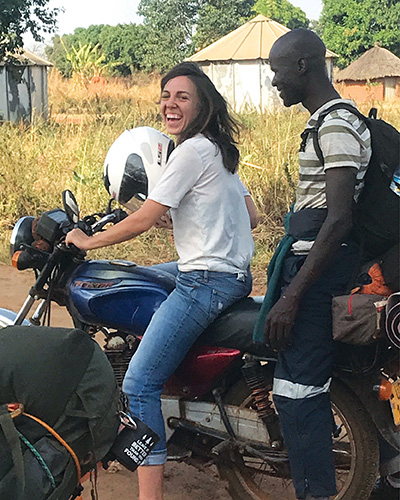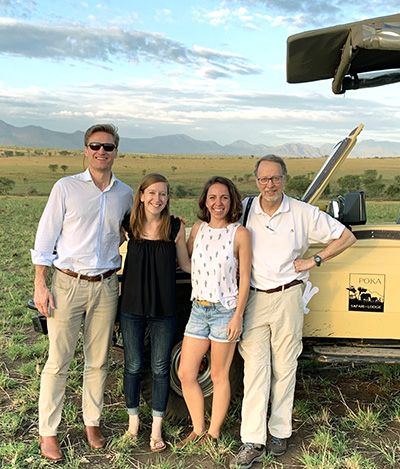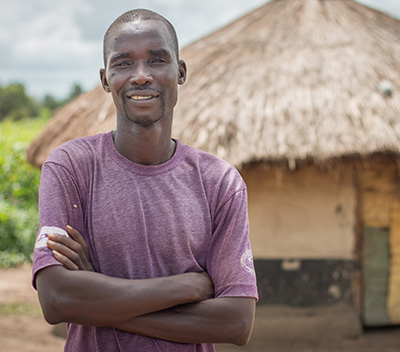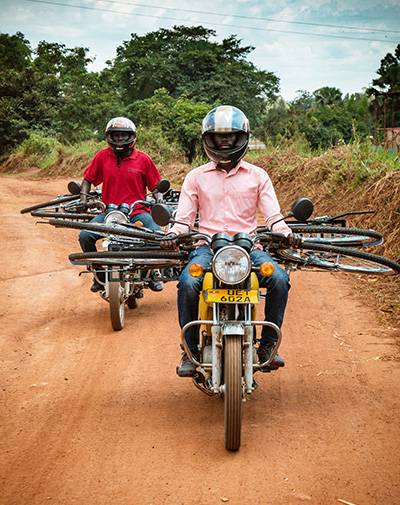 Menu
Menu




Kate Palla, BA ’10, gets to her office in Gulu, Uganda, by hailing any motorcycle driver who doesn’t already have a passenger.
“For 15 cents, they’ll take you anywhere you want to go,” she explained. “It’s the least expensive Uber ever.”
Palla is the director of finance and operations for Cycle Connect, a high-growth asset-finance company based in Uganda. She spends about 75 percent of her time there, the rest working remotely from the U.S. — usually at her family’s home in Napa, where she grew up. Sometimes conferences or other commitments take her to other parts of the U.S., such as New York City, or to Europe (London, namely).
While in Uganda, Palla divides her time between the rural Northern city of Gulu and the capital city of Kampala; Cycle Connect owns houses in both places that are shared by three or four employees at a time, those like Palla who travel frequently. Otherwise, of the four American, one Nigerian and several Ugandan staff members, the majority are based full time in Gulu or in Cycle Connect’s second branch in Lira.
“It’s a pretty transient lifestyle,” said Palla. “It’s like consulting when you travel all the time; I just got back to Uganda last week, and I’m leaving Friday to go back to the States for three weeks, then I’ll be back in Uganda for a month and a half.”
Right now, this transience appeals to Palla, who has always had a “big travel bug.” She went to Rome her sophomore year at UD, of course: “It wasn’t my first time abroad, but my first time being able to spend time abroad with friends,” she explained. This experience led to later girls’ trips with friends to places such as Portugal, Cuba and Puerto Rico. At UD, Palla also participated in the Mexico summer program; she had a concentration in Spanish to go along with her business major.
“I enjoy interacting with people in their native language,” she said, “and finding connection to a different culture through living in it.”
Post-graduation, Palla spent seven months as a volunteer with the Hogar de Don Bosco in Tegucigalpa, Honduras; she had learned about the program from another UD alumna, Rebecca Castellanos, BA ’10, who had also participated in it. Palla lived at a home for children who resided with her and the other volunteers during the week; they would go to school during the day, then come home to do sports and other activities with the volunteers. They spent the weekends with their families.
“What I learned through this program is that it’s a person-to-person transformation you’re looking for,” she said. “You’re not going to change everything; you have to look for ways to give good experiences. One priest who had worked in the home for 17 years had the children of his first participants coming through the program. For some, he hadn’t been able to break the cycle in these families of gangs and jail, but he stayed hopeful for the next generation.”
After Honduras, Palla moved to Washington, D.C., where her UD classmate, Joe Haine, BA ’10, connected her to the company Accenture, at which she landed a job in finance.
“A few years in, I still had the itch to get back into international work, so I enrolled at Johns Hopkins School Advanced of International Studies, a top-tier international relations master's program that sends students into development, the government, and jobs in finance and economics,” she said. UD had been crucial to Palla’s acceptance to this program because it had required her to take economics and statistics classes, prerequisites for Johns Hopkins.
In Honduras, Palla learned the necessity of forging connections with people where they are; this lesson is reinforced daily in Uganda.
“It helps to be there to appreciate the nuances of living and working in Africa,” she said. “The two biggest differences work-wise are that I moved from an established corporation to a startup, and from D.C. to Africa; living-wise in Africa, it’s a big adjustment, because it’s a very different culture from Western culture. Things that are commonplace for us in the U.S. are not there; there are different norms. Nothing is as easy; especially in the rural areas, the power goes out all the time, and the buses are never on time, and so on. There’s no air conditioning. There are fewer rules, and the politics are tricky; a lot of this relates to living in a post-colonial country, where I’m constantly reminded that there’s a bigger history there that the U.S. wasn’t part of.”
In navigating this history and culture, too, Palla’s training through the Core has been helpful, albeit sometimes in a roundabout way.
“The Core is very Western-focused,” she explained. “I wasn’t exposed to African history or authors, but I gained an in-depth knowledge of my background and culture. Being able to go back so far in my own culture, I can recognize how deep the differences from the African culture go, but somehow this helps me to understand that there’s a process and a development to every culture, and to break it down to see our cultural differences more clearly in an effort to understand theirs.”
“I credit my education for my critical thinking developed from UD’s Core and SAIS' economics training,” she added. “These components have opened and somehow grounded my thinking to allow me to reason through new problems as I face them. In all jobs, but especially jobs in different cultures and startups, there are so many novel challenges that you face, and it’s my deeper set of reasoning structures that enable me to sift through the details to the deeper question at hand and solve that problem, not just the one in front of me.”
Cycle Connect’s specific focus is on helping smallholder farmers who earn $2.50 to $5 USD per day to secure financing on farm equipment in loan sizes ranging from $100 to $1,000 USD.
“It’s a social enterprise, which is a company meant to provide an environmental or social good as well as financial returns,” she explained. “It’s a for-profit in Uganda, but in the U.S. we’re structured as a nonprofit. We teach the farmers to use the assets and to earn income from them, so they’re earning money while they’re paying back the loans. Sometimes the loan is for something as simple as a bicycle for $100 USD, which even a farmer earning $2.50 USD per day can afford. We access farmers the banks don’t, because they’re so deeply rural.”
“Working in a social enterprise has opened my eyes, and I will definitely take this experience with me in the future,” she added. “We really have to design around the customer; our farmers experience challenges we’ve either never had in the U.S., or that we had so long ago that we wouldn’t think of them now. A bicycle alone can have a massive impact on these farmers. Without it, they might have to walk half a day. There can be a disconnect with life on the ground and life in the corporate headquarters, so I go to the field every couple of months to interact directly with customers.”
When Palla is working in Kampala, her office is in a coworking space shared with many other African-owned digital startups, which leads to multiple opportunities for networking and meeting key partners.
“At Cycle Connect, we're still in startup mode and are experiencing exciting two-times year-over-year growth in sales, staff and funding,” she said. “I've appreciated this role in particular as I get to know our customers where they live and see the impact our company has had in their daily lives, as well as see the operations of a company from the top down working on our three-year strategic plan, a major rebrand, a structured talent acquisition program and our first round of debt financing.”
Sometimes all of the travel can get tiring, though: “It’s more familiar to be at home,” explained Palla. When she is home, in the U.S. and in Napa, she enjoys being in the mountains, skiing or hiking, and relaxing on the beach.
A former UD soccer player, Palla relishes memories of practices and games with teammates, of her fall Rome semester, of nights in Old Mill. She appreciates that UD allowed for experiences beyond her major, such as taking a ceramics class with her roommate, who was an art major, and of course playing soccer.
Working in a career that many wouldn’t immediately imagine, Palla wants current UD students to know how necessary it is to meet people for coffee, to learn about a variety of careers and experiences to best determine their own particular paths.
“I wouldn't change my education, but the one thing I wish I’d known before I graduated from UD was how important internships and informational coffee chats were to getting exposure to different professional career paths and opening doors to interviews at desirable companies,” she said. “My piece of advice for a UD student is to send a LinkedIn request to an alumnus in a field they’re interested in. I always respond to students reaching out from UD or SAIS, to share my experience and offer any assistance I can to support their endeavors.”